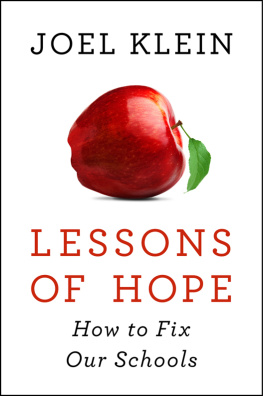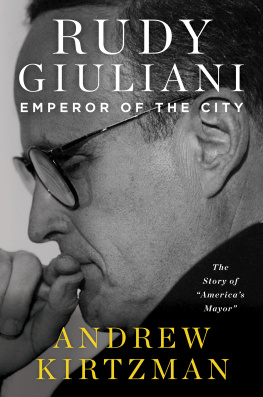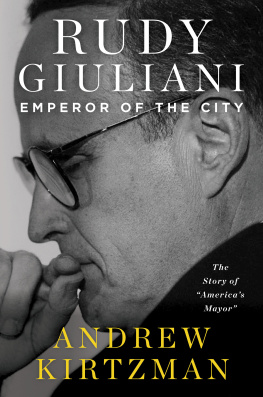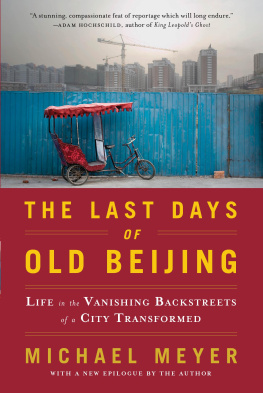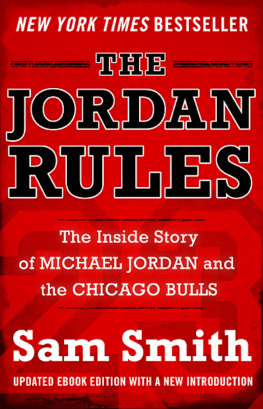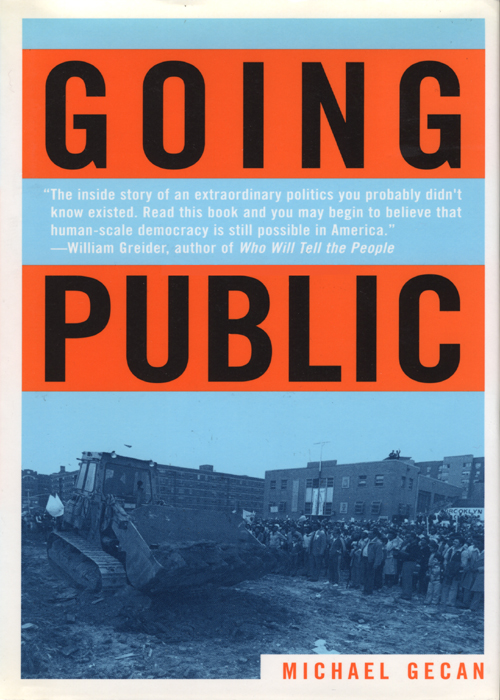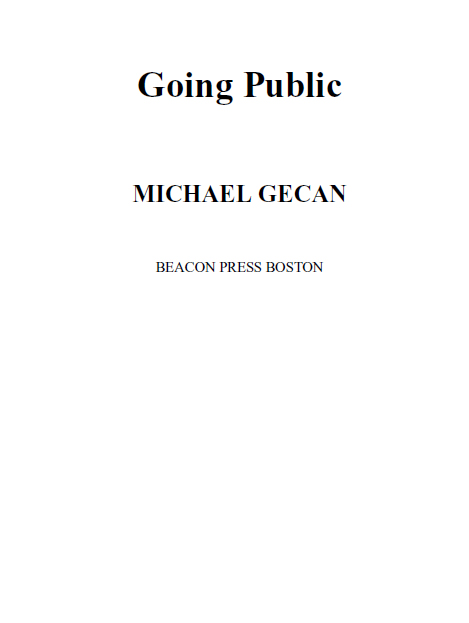
FOR SHEILA
CONTENTS
PREFACE: WHY ORGANIZE?
I am an organizer. Its a strange wordorganizera word from the past, a black-and-white photo of a person passing out fliers to workers leaving an auto plant.
But its 2002, and I am an organizer. Not a consultant to so-called faith-based programs. Not a facilitator. Not an adviser. Not a service provider or do-gooder. Not an ideologue. Not a political operative. Not a pundit. Not a progressive. Not an activist.
Im clearly not a lot of things. In my organizing, I use other old-fashioned words like leader and follower, power and action, confrontation and negotiation, relationships and institutions. These words still form the phonics of the larger language of politics.
With these basic tools, the plots and subplots of public life, no matter how intricate, begin to make sense. Characters come to life. Motivations emerge. Relationships reveal themselves. Themes and story lines become clear. The reader can begin to talk back to the teller of the tale, can begin to judge, or can pick up a pen and create a different world. In the public arena, participation and action and change can take place.
But I wont begin to make sense unless I follow the advice of my former college professor and poet laureate, the late Robert Penn Warren, and tell some stories. We took a walk one day on the Connecticut roads near his Fairfield home. It was a brisk winter afternoon, and his dog was yanking him along. As we walked, he provided a gentle but thorough critique of a novel I was working on at the time. He kept coming back to a simple theme: Just tell the story. Forget everything else and tell your story. He was repeating what he had already written in his wonderful book-length poem, Audubon: A Vision, Tell me a story./ In this century, and moment, of mania, / Tell me a story /... Tell me a story of deep delight. So, many years later, I will follow the advice of this wise teacher and tell you some stories from my life, the beginnings of my life as an organizer.
I grew up on the west side of Chicago in the fifties and learned that we live in a world of powerraw powerlong before I knew the word. My mother and father bought a tavern when my sister and I were quite young. As a six-year-old, I served shots and beers to the men who sat along my section of the bar. My customers were Italians, Irish, and fellow Croatians. They walked down the hill a block away from the Chicago and Northwestern Railroad yard at noonfor a couple of shots, a couple of beers, and sandwiches and soup made by my mother in the kitchen. My father built a small platform behind the bar so that I could serve my crowd.
I remember this as a glorious time in my lifea time when I was admitted to an adult world of strength and laughter and toughness. (My parents remember this as a period of unremitting pressure and endless work.) The time ended on a sunny afternoon. The young man from the mob came in to pick up his monthly payment. My father explained to him that, because by mother had taken ill, we were short. As my father and the young man talked, all the other men at the bar became silent, looked down at their drinks, or stared straight ahead. The young man told my father that he knew what he had to do. My father nodded. Then the man turned around and walked out. Slowly, conversation picked back up. Someone ordered a shot of vo and a Schlitz. That night, my father closed the barGuss Tavernfor good.
No matter where you turned, you ran smack into people with power. The power of the mob. The power of the police. The power of the Cook County Democratic Partywhich demanded three hundred dollars from every working man in our neighborhood who sought a city job. Three hundred dollars was a lot of money in those days. And all that it bought was a place on the list. No one knew for sure, but the sense was that a small percentage of people eventually got jobs. The rest paid off, sat silently, and had nowhere to go and no one to complain to when their payoff didnt work.
Life on the street was no different. As a white, working-class boy, I grew up fighting black, working-class boys. We jumped them. They jumped us. We feared them. And we wanted them to fear us. Our lives were strictly circumscribeddivided by el lines, railroad tracks, and major thoroughfares. Cross any border and you had to be prepared to pay the price. Every aspect of our upbringing taught us either to avoid or to confront one another.
Our lives were a series of serious and sudden skirmishes. One afternoon, two friends and I were sitting on a curb. In the distance, three blacks, about our age, walked along Ferdinand Street, toward us. They ambled, it seemed to me then and in memory, incredibly slowly and casually. As they approached, the toughest of our three, Mike Stepkovicz, now dead, pulled out his knife, opened it behind his back, and waited. No one moved until they were right in front of us. Then Stecks, short and stocky but quick as a snake, grabbed the lead boy, put the knife to his neck, and asked him where the fuck he thought he was going. The boys eyes were wide, unblinking. No words came out of his mouth, although his lips moved. The rest of us just froze. As quickly as he struck, Stecks let the kid go and told him to head back the same way he came. We watched them walk away, faster now, back toward Pulaski Road, south toward Lake Street, out of our turf, out of our sight.
And there was the much more complicated power of large institutionsparticularly the Roman Catholic Church. Our parish, Our Lady of the Angels, anchored our lives. Its where we prayed, socialized, played bingo, went to school. This same parishand scores like itoften turned a blind eye to the needs of the working-class whites who packed its schools and sanctuaries.
I watched as my mother tried to convince our local pastor to do something about the real estate hustlers who were panicking white families to leave the neighborhood by warning of the impending flood of black buyers. These hustlers spoke every language we spokeCroatian, Italian, German, and Czechoslovakian. They called every day, many times a day, and then into the evening, and then all through the night. They roused bone-tired factory workers from their beds to alert them to how much their home had lost in value that week, to make them one last offer. Exhaustion and fear grew. Neighbors moved suddenly, without a word of warning. Then panic spread. The real estate agents bought low from our families and sold high to black families eager for a better and safer life for their children. They ravaged entire sections of a once great cityseveral times over. They drove families like mine from neighborhood to neighborhood, two, three, and four times, further west and northwest and southwest toward the suburbs, losing more equity, hope, and faith each time. Then they bankrupted black and Hispanic buyers and steered them into new ghettoes.
My mother went to the pastor and described all this. He nodded and said he would get back to her. He never did. We found out later that he essentially redrew the lines of the parish to exclude our four square blocks, which turned from nearly entirely white to nearly entirely black in one traumatic and violent summer in the late sixties. We didnt move for three more years because my Croatian grandmother, who owned our house, and who would have survived the bombing of Vukovar, refused to leave.
My mothers actions introduced me to a different kind of poweran attempt by someone to defend herself and her family, to enlist other families in the effort, to research an issue and understand it well, to take that research and analysis to a place where she thought her work would be welcome. She did all this with a positive spirit. She related as openly to our new black neighbors as to our fleeing white friends. Deeply disappointed by the inaction of the pastor, she didnt use that disappointment as a reason to retreat from all public matters or to reject her local parish or her larger church.


